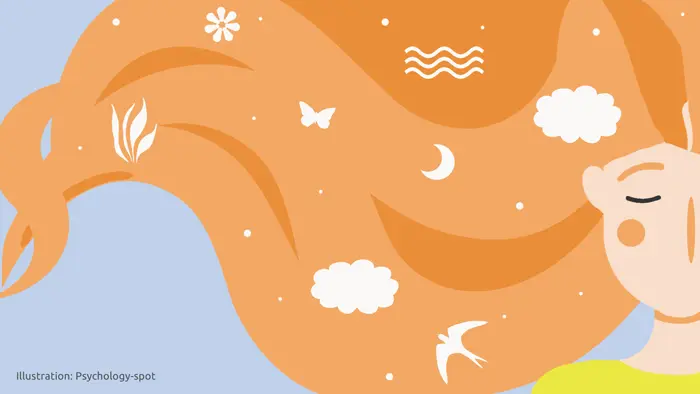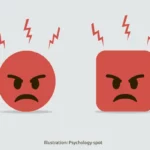
Sometimes the unexpected is what changes your life. Sometimes, it is those twists in the script, the surprising twists, that mark a before and after. Other times, of course, life slowly changes, decision after decision, accumulating small transformations that end up being huge when we look back.
However, it is those unexpected changes that usually generate a more powerful inner transformation because they have the power to shake our foundations. We can use them in a positive way or we can let them drag us down emotionally. Making one or the other decision depends fundamentally on us.
How does the brain react to unexpected changes?
Dealing with unexpected changes is not easy, especially when they cause an earthquake in our lives, but understanding what happens in our brain will help us better cope with these radical transformations.
When we are faced with an unexpected change, the “conflict sensors” in our brain are activated, causing a mental chaos called cognitive dissonance. Unexpected changes remove the anchor points we normally use to orient ourselves in the world. This can create a state of inner chaos that generates a high level of stress and anxiety.
Much of the chaos unleashed by change is due to the uncertainty it brings. A classic study in psychology discovered that we tend to react worse when we don’t know for sure what will happen. These researchers told a group of people that they would receive a mild or intense electric shock as part of the experiment. A second group were assured that the shock would be intense. Interestingly, people in the second group reported feeling calmer and less afraid.
The desire for clarity and certainty is a basic drive consistent with our brain’s need to make sense and find logic in what happens. The aversion we experience towards uncertainty and unexpected changes is a reflection of our neural responses, mainly in areas such as the anterior cingulate cortex, the insula and the amygdala, which are activated when we feel in danger or especially vulnerable because the rules of the game have changed and we don’t know what could happen.
Luckily, our brain also has great plasticity, which is its ability to adapt to changes that occur in our environment. Plasticity provides us with the cognitive flexibility to learn from experiences, monitor the world based on our expectations, and adjust our behaviors when things don’t go as planned.
How to deal with the unexpected that changes your life?
1. Even positive changes can cause discomfort
It’s okay to feel this way! That is the message you must repeat to yourself – over and over again. Don’t judge your emotions. Even positive changes can generate anxiety, tension or uncertainty. Knowing that you have been given the job of your dreams, that you are finally moving to the city where you have always wanted to live, or that a baby is coming into your life can be as exciting as it is threatening.
It is totally normal. Our brain does not make great distinctions between positive or negative changes, because both represent a break with what is known and involve a certain degree of uncertainty that generates insecurity. You just have to know that this is the way in which your brain protects you from the unknown and warns you that you must be alert. Don’t blame it for that.
2. Don’t fight change, try to accept it
In many cases, suffering occurs or increases when we resist what happens. Therefore, the best way to deal with the life-changing unexpected is to accept it. Obviously, this is easier said than done, since resistance to change is an evolutionary response that is activated when our brains work in “protective mode”.
However, our brain can also learn to accept that change and adapt to a different routine. Therefore, instead of wishing things were different, try to flow with the circumstances. Focus on the present moment and on what you can really control. Don’t fight change, embrace it.
3. Acknowledge your negativity bias
Many of the unexpected changes in life cause uncertainty, so this is likely to affect our way of thinking. If you don’t know what will happen next, your brain will scan all possible paths and you may end up feeding a doomsday vision.
No one is immune to negative biases. When the changes are very big and unexpected we can think the worst. In fact, studies have shown that when we are not sure what will happen, 75% of people wrongly predict that something negative will happen. It is the way our brain has to prepare us to face the worst scenario in the best possible way.
However, acknowledging that automatic response can help us navigate unforeseen changes in a healthier way, limiting their emotional impact. Instead of giving free rein to your catastrophic thinking and letting it make you feel bad, tell yourself: “It is fear and uncertainty that make me think this way. However, feeling insecure does not mean that the future is negative; It just means I don’t know exactly what will happen.”
4. Regain control by making contingency plans
Dealing with unexpected change is so difficult because it takes control of the situation away from us. However, instead of falling prey to panic or paralysis, to regain some security it may be wise to establish contingency plans. Make the most of your catastrophic thinking and choose the most likely options to find solutions. For example, you can think “If my work hours are reduced, I will start that professional project that I had on the back burner” or “If I feel too stressed, I will start practicing mindfulness”.
In situations of change, it is important to anticipate problems and setbacks to maintain our roadmap. It’s about making alternative plans that are viable and give you back a sense of control, instead of falling into the worry loop. Taking a proactive attitude is a natural stress reliever. In any case, remember that it is not about adding more pressure to an already tense moment, but about finding mental clarity. That will help you deal with the uncertainty and anxiety that big changes bring.
5. Keep the routine, as far as possible
The unexpected, that which changes your life, usually means a real emotional tsunami. When you can’t find your cardinal directions and the earth seems to shift under your feet, it can be helpful to find safety in what feels familiar. In general, the more changes that occur or the bigger they are, the more important it is that you try to stick with your routines. Obviously, as much as possible.
Habits give you confidence and security. They can become your anchor in uncertain times. In addition, it has been proven that they help us clear our minds so that our unconscious can continue processing what has happened. If you’re very stressed or anxious, sticking with your routine will also be one less thing to think about. One less decision to make. Therefore, it will save you energy.
If you have a moderately effective routine that allows you to maintain a minimum of functionality, you can feel better. Think about what you can do now to be better, maybe not right away, but later. Ask yourself: What can I do right now that will have a positive impact or make a difference later? Do it!
6. Take advantage of the momentum of change
The unexpected is what changes your life. And that’s not necessarily negative, although sometimes scary. Major changes can generate the momentum needed to undertake a positive transformation. Once change has gotten you moving and out of your comfort zone, it’s easier to take the next step. The diagnosis of hypertension or diabetes, for example, can be the stimulus you need to start following a healthier diet and practicing physical activity.
Important events break the inertia of day to day and open a window of opportunity through which to look back on our lifestyle, thus becoming an opportunity to make long-term positive transformations in our behavior. Although it can be overwhelming at first, the secret is to take it one step at a time.
7. Focus on gratitude
A simple but effective way to deal with unexpected changes is to focus on gratitude. In this way we can assume a psychological distance and see things in perspective. Focusing on the positives is much healthier than letting yourself be overwhelmed by negativity and pessimism.
Ask yourself: What do I feel most grateful for? What is really going well in my life right now? What do I appreciate? You can start each day by writing down three things you are grateful for, from your health and your family to that special cup of coffee you drink in the morning.
Has that unexpected change brought you closer to a person? Has it pushed you to practice healthier habits? Has it made you more assertive or resilient? Maybe it helped you understand what is really important in your life? When things go wrong, focusing on the negative is easy, but most unforeseen changes represent an opportunity to grow, so it’s important to recognize how life can improve from it.
The key is to try to move through this big moment of change in the most positive way possible. It may mean loss in many ways, but it can also mark the beginning of a different life or help you be a better version of yourself. After all, as Sartre said: “Freedom is what you do with what’s been done to you.”
Sources:
Lourenco, F. & Casey, B. J. (2013) Adjusting Behavior to Changing Environmental Demands with Development. Neurosci Biobehav Rev; 37(900): 10.1016.
Arntz, A. et. Al. (1992) Unpredictable sudden increases in intensity of pain and acquired fear. Journal of Psychophysiology; 6(1): 54–64.



